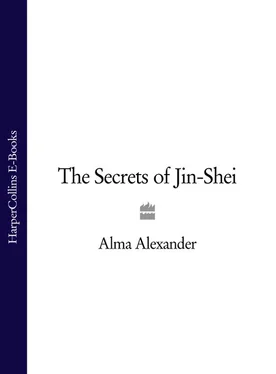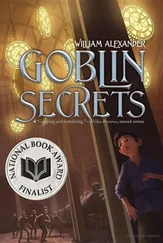In fact, she had already started keeping an eye out for likely prospects – young men sufficiently learned to have access to the things that she wanted to find out, or wealthy enough to buy such access, or both. Unfortunately most of the younger suitors she had considered – the ones her parents would consider suitable – were also dismissed early, on the grounds that they were simply too boring to be of any interest. Khailin wondered if she would be able to hold out for a husband who might be considerably older than her but whose age would be traded off for the fact that he could be more easily cajoled by a young wife to allow her to do the things that Khailin had every intention of continuing to do. Study. Read.
A diffident knock on her door interrupted her thoughts, and at her barked call of admittance a servant, hands together and bowing deeply to her young mistress, came in to announce that Khailin’s presence was required by her mother, the lady Yulinh.
‘Tell her I will attend her at once,’ Khailin said, and the servant backed out, bowing again.
Khailin sighed. She suspected her father had stopped off in his wife’s quarters to suggest that she take Khailin in hand today, and she knew what that meant.
She wasn’t wrong.
Lady Yulinh was a great believer in the power of purification and meditation. She visited the ritual baths frequently, an activity that Khailin profoundly despised for the same reason that she found hacha-ashu more interesting than jin-ashu – she didn’t do well when cooped up in the presence of undiluted femininity for long. She found most of the women at the baths tedious, gossipy and unspeakably dull. They found her far too direct, almost abrasive, certainly bordering on rude although she was careful not to directly antagonize any of the matrons whom she might find as a mother-in-law one day. But being on her best behaviour and flawlessly and icily polite for three to four hours at a stretch, which was how long her mother’s purification bath rituals usually took, exhausted her and made her severely irritated. Even her mother had learned not to take her along to these occasions any more often than she could help, and to stay out of her way for a while on their return home until Khailin could work out her waspishness on some unsuspecting servant.
Visits to the Great Temple were another matter. Lady Yulinh was possessed of sufficient stature and financial backing to be regularly admitted into the Third and even the Fourth Circles of the Temple. She insisted that her daughters – for her younger daughter, Yan, had been required to attend these devotional trips since she was eight – perform the required rituals and protocols with her, but once the official part of the visit was over the girls were free to use their time at the Temple as they wished until Yulinh was ready to leave. For Yan, that meant a return to the more colourful and more interesting First and Second Circles; she had become an early addict to ganshu readings and to soothsayers of every stripe. Khailin chose to linger in the inner Circles of the Temple, the Third and Fourth Circles, the ones with fewer people and more power. She preferred her knowledge empirical and her data neatly proved and documented by experimental protocols – but knowledge was knowledge, and the more empirical chemical and alchemical branches of study all had roots in the Temple and the deities it housed. The rest would come.
At least it was the Temple that Yulinh proposed that day. She did not mention the baths, at least not directly. Khailin was grateful for that mercy, at least; she didn’t think she could have handled the baths with any degree of grace that day. The Temple was at least a potentially worthy substitute for the missed reading lesson.
Yulinh and her daughters were deposited at one of the Temple gates in their sedan chair, followed by a couple of quiet servants who had followed close behind in a second chair. Yulinh sent one of the servants to purchase a particular kind of incense, the other to obtain a bottle of rice wine and the proper amount of rice and beans for the supplication ritual she had in mind. Then she swept past the teeming corridors of the First Circle, heading into the inner sanctums. Her two daughters, eyes piously downcast, trailed at her heels.
They had gone straight through to a shrine to I’Chi-sei, one of the Three Pure Ones. Yulinh had been suffering from a lethargy and a lack of energy lately, what with the oppressive heat of the summer. Khailin was privately of the opinion that her mother might have done better to have stayed in the Second Circle and asked succour of the Spirit of Rain instead of beseeching a God of the Early Heavens for the energy which the hot dry weather sapped from her, but she held her tongue. When her mother was immersed deeply enough in her devotions not to notice that Khailin was absent, she slipped away unobtrusively and went seeking her own enlightenment.
In the gardens of the Third Circle Khailin found an acolyte drawing a finely detailed sand painting mandala in an oiled wooden frame. He was seated in front of her favourite shrine, that of Sin, Lord of the East, the deity who was ascendant in her own birth sign and to whom she had a special devotion. Khailin stood watching him for a while, her hands tucked decorously into the wide sleeves of her red silk tunic. She knew better than to interrupt, but when he took a break, sitting back and reaching for a flask of rice wine left at hand, she knelt down next to him.
‘What is it for?’ she asked.
‘It is for a lady wishing for a favour from the Lord Sin,’ the acolyte said courteously. ‘This will be placed in his alcove with a lamp filled with holy oil, until such time as the lady tells us that her wish has been granted, or that she has withdrawn the petition.’
‘Do they work?’ Khailin asked. She had seen them before, the sand paintings, placed in shrines beside more prosaic offerings, beautiful and cryptic and mysterious. She had never seen one being prepared at such close quarters before, and inspected it with some curiosity. ‘What do you use to dye the sand?’
‘Are you wishing to join the Temple some day, young sai’an ?’ the acolyte asked, smiling. ‘These are Temple secrets. We do the Gods’ work. As for whether these are successful, that is not something we are in charge of. We facilitate the contact. The wish and the granting of it are between the one who prays and the God who listens to the prayer.’
‘I have heard the saying that the Gods help those who put themselves in their path,’ Khailin said. ‘But this sand painting …; this is so passive. It’s like there’s too much cha’ia energy here, and not nearly enough chao. ’
The acolyte raised an eyebrow. ‘You are learned, young sai’an. ’
‘Is it not better,’ Khailin said, ‘to know the prayer and to make something that answers it? If a sickness, then an elixir, or a medicine. If a child, then a way of conceiving, or a way of adopting. If a lover –’
‘That is too much for the Gods’ acolytes to aspire to,’ said the acolyte hastily, cutting her off. ‘And much of that, people do get. But not from here.’ He made his disapproval obvious, but did not explain it further.
Khailin, however, had already read enough to know of the dichotomy of alchemies in the Way of the Cha in which the Gods and spirits of the Great Temple were enshrined. That had been in one of the earliest scrolls she’d taken from her father’s library. She had practically learned the thing by heart:
Cha is the path of the spirit and energy and power. Cha is part of every thing and every creature in the world. Pure Cha is what the highest Heaven is made of, a perfect place where the male and the female, the chao and the cha’ia, meet and meld in flawless balance and equilibrium, where the Seeker loses the self but becomes the whole world …;
Читать дальше






![Theresa Cheung - The Dream Dictionary from A to Z [Revised edition] - The Ultimate A–Z to Interpret the Secrets of Your Dreams](/books/692092/theresa-cheung-the-dream-dictionary-from-a-to-z-r-thumb.webp)





